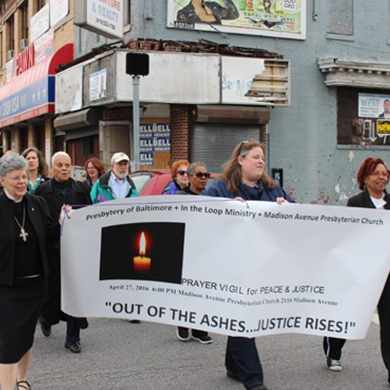

(This article is a reprint from the May 23, 2016 “Tidings” e-newsletter published by the Presbytery of Baltimore.)
by Timothy R. Hughes, Associate Pastor
Brown Memorial Park Avenue Presbyterian Church
There is such a thing as holy discomfort. It’s that prick of unease you feel when stepping into the unfamiliar place where God is calling you. It’s the unsettling nudge that lets you know that imminent change, however unwelcome, is both necessary and right. And then there are other kinds of discomfort that come with the knowledge that something has gone awry. I felt both kinds of discomfort at the Presbytery’s Vigil for Peace and Justice at Madison Avenue Presbyterian Church on the anniversary of the Baltimore Uprising.
The Vigil, which I helped to plan, was born out of a desire to step out of our comfort zones, acknowledge the pain and progress of the last year, and stand in solidarity with a community (including several of our own churches) which was acutely affected by last year’s unrest. Much of the best of that vision was realized in the service itself, which was held on the lawn outside Madison Avenue Presbyterian Church. There were songs and stories from local residents, reflections and prayer, and young people from Jubilee Arts (a local non-profit) shared their art. Many thanks to Phyllis Felton and the members of Madison for hosting us and leading us in worship.
The march that preceded the service (three city blocks between the CVS at Penn/North and the church), however well-intentioned, became a flash-point of conflict which I think we would be wise to reflect upon. Our marching group reflected the demographics of the Presbytery. While we drew from an impressive number of our congregations, we presented as a largely white middle-class group, walking down North Avenue with a police escort and a news reporter. When we arrived at the CVS to begin the march, we discovered a protest that had already been in place for several hours – the friends and family of Tyrone West. Mr. West died in police custody in July of 2013 and his family has publicly protested every Wednesday since his death. The West family was quickly dwarfed by our group and they responded with anger and confusion as we gathered before the news cameras.
As we moved through our liturgy, angry shouts and questions were in the air. “Who are they?” “Who do they THINK they are?” “No, seriously,” one man said. “I don’t know who they are. We’ve never seen them here before.” We were asked in many different ways to leave the area. And soon enough, the march began, and our group departed.
Several of us stayed behind to talk with the protesters. After the group and cameras departed, it was easier to dialogue. “To us, ya’ll came out of nowhere,” one man said. “Why didn’t you reach out to anyone in the protest community before organizing a march on the anniversary of the Uprising?” I acknowledged that we should have. “The truth is, we welcome you here,” he said. “We would love to have you march with us if you are interested in justice for people like Tyrone West. But we don’t want you to march in front of us.”
Walking back to the church, I reflected on the mistakes we made. While our march was well-intentioned, there were also textbook examples of privilege in play. If we truly wish to be a part of God’s reconciliation in the city, it must begin with and revolve around building relationships of trust across race and class in every affected community. If we are not rooted in relationships of trust, doing more listening than talking, and seeking what God is already doing in oppressed communities, we risk doing damage where we hope to bring healing.
In the end, I’m proud of the steps that our Presbytery has taken this year to have difficult conversations and to seek justice in Baltimore City. It would be easier to stay in our comfort zones and I’m so glad we are stepping out. But there is much more work to be done and holy discomfort will surely continue to be part of it. I, for one, am anxious to learn from mistakes made and continue to build relationships and trust that will foster the spirit that so many of us long to see in our fractured communities.